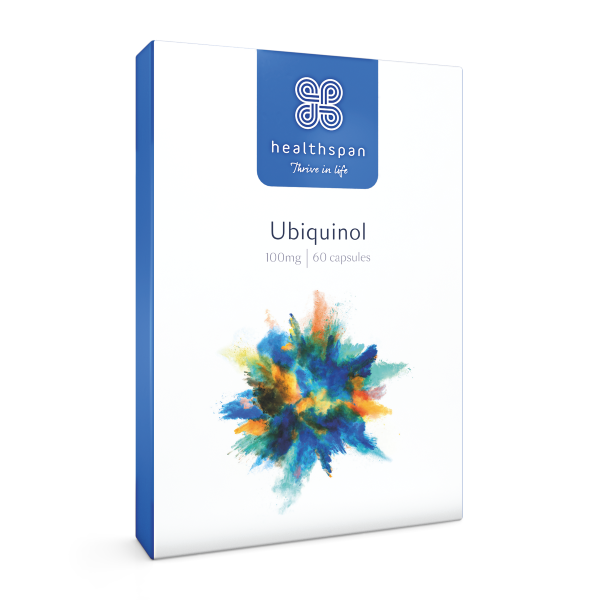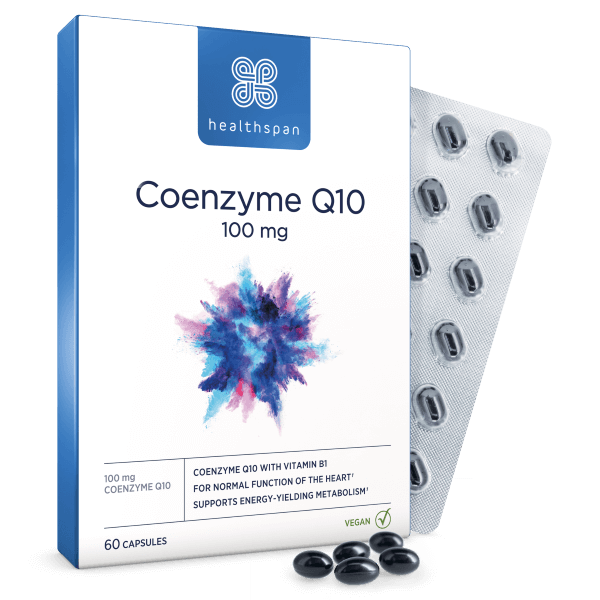CoQ10 is vital for energy production, as well as the health of your heart and brain. Find out why, and how a supplement may help.
🕒 2 min read
What is CoQ10?
Coenzyme Q10 (CoQ10) helps to drive the cell machinery that burns glucose and fatty acids to create energy.
Cells with the highest energy requirements have the greatest need for CoQ10, meaning it is especially important for organ and muscle cells – including those found in the heart.
CoQ10 supplements usually come in two forms: CoQ10 and ubiquinol. Ubiquinol is the active 'body-ready' form of CoQ10.
Organs and tissues, such as the heart, liver, kidneys and muscles, use stacks of energy, so CoQ10 is especially important for them.
How does CoQ10 work?
Mitochondria, the batteries of our cells, use CoQ10 to generate energy.
There are two types of CoQ10. Ubiquinone, the most commonly available in supplement form, is the oxidised form, meaning it has gained oxygen, a process akin to iron rusting. Ubiquinol is the reduced form, meaning it has lost an electron. Think of it as a refined version of ubiquinone.
These two forms of CoQ10 revolve in a cycle where they alternately gain and lose an electron in the process of energy production. However, within our bloodstream, more than 90 per cent of CoQ10 is present as ubiquinol.
So although taking either form of CoQ10 works, ubiquinol gets you one step ahead. Remember that without an adequate supply, our cells won't work properly.

Ubiquinol (CoQ10)
High-absorption form of coenzyme Q10 with vitamin B1 to support your heart health and energy metabolism
- 100mg ubiquinol, the most absorbable form of coenzyme Q10
- Coenzyme Q10 is needed for energy production in cells
- Vitamin B1 contributes to metabolism and nervous system function
What can CoQ10 help?
The amount of CoQ10 generated by our cells peaks at around the age of 20 and drops as we grow older. Here's how keeping your CoQ10 levels up can help your health.
Heart failure
People with heart failure (inefficient pumping of the heart) have lower CoQ10 levels than those who don't. And those with more severe heart disease have the lowest levels.
Studies suggest that CoQ10 can improve muscle strength and the amount of blood pumped out with each heartbeat (also known as ejection fraction). Taking it can help to improve blood levels and heart function, so it is being used increasingly in medical treatments.
High blood pressure (hypertension)
The results from 12 clinical trials concluded that CoQ10, which is converted by the body into ubiquinol, could potentially lower blood pressure by as much as 17/10mmHg in people with hypertension, without significant side effects.
Fertility
Egg and sperm cells contain high concentrations of mitochondria, which rely on CoQ10 to function.
In women with polycystic ovary syndrome (PCOS) who failed to conceive while taking an ovulation-stimulating drug (clomiphene citrate), research shows that those who were also given CoQ10 ovulated in 66 per cent of cycles compared with 15.5 per cent for those not taking CoQ10.
A study involving infertile men found that taking 200mg CoQ10 significantly improved sperm counts by 81 per cent and sperm motility by 31 per cent after 24 weeks' treatment.
Available forms: tablets, capsules (oil-based offer better absorption.)
Dosage: The daily dose of ubiquinol CoQ10 for general use is 100mg, which is equivalent to around 280mg ubiquinone CoQ10.
Watchpoints: No serious side effects reported. Ubiquinol is well tolerated, although very high doses may cause stomach upsets.

Coenzyme Q10 100mg
100mg CoQ10 for normal function of the heart
- Supports heart health and energy-yielding metabolism
- Sunflower oil base aids quicker absorption
- Fermented for optimum purity







